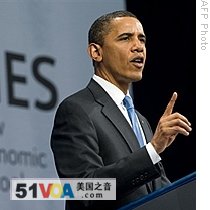Moscow
08 July 2009
 |
| U.S. President Barack Obama delivers remarks during the New Economic School graduation ceremony in Moscow, 07 July 2009 |
Novaya Gazeta is a newspaper known for its critical and investigative journalism. It also has the sad distinction of having had four of its journalists murdered for their work in recent years. Their unresolved killings are associated with concerns about the rule of law in Russia.
In response to a question about the high-profile case of imprisoned businessman and Kremlin critic Mikhail Khodorkovsky, U.S. President Barack Obama told Novaya Gazeta it is improper for outsiders to interfere in the legal processes of Russia. Instead, he reaffirmed support for what he said was Russian President Dmitry Medvedev's courageous initiative to strengthen the rule of law, which includes the right to a fair trial and making sure courts are not used for political purposes.
As head of the now defunct Yukos Oil Company, Mikhail Khodorkovsky was once Russia's wealthiest man. But he is now in the fifth year of an eight-year sentence for tax evasion, embezzlement and fraud.
Russian human-rights activists say Russian courts have railroaded Khodorkovsky and associate Platon Lebedev to prevent them from mounting a political challenge to the Kremlin. President Obama told Novaya Gazeta it seems odd that new charges have been filed against the two businessmen just as they become eligible for parole. Conviction in his new trial could keep Khodorkovsky in prison for an additional 22 years.
Russian opposition leader and former world chess champion Garry Kasparov says Mr. Obama did not talk specifically about the Yukos case during his meeting late Tuesday with Kremlin critics. Nonetheless, Kasparov told VOA he believes Kremlin leaders did not expect Mr. Obama's willingness to deal openly with the opposition.
"Russian-American relations are not only about relations between the White House and Kremlin. But it is about Russian and American people. It is NGOs, it is about other elements of the civil society, and he was very much on that message, and he reiterated the importance of these contacts during the conversation with members of the opposition," Kasparov said.
Kasparov says Mr. Obama noted he has limited influence on human rights and democracy in Russia, but added that the United States is always engaged in ongoing talks with opposition groups and non-governmental organizations.
President Medvedev last month introduced a bill that would reduce government scrutiny of Russian NGOs. The move follows restrictions enacted in 2006 by former president Putin, who signed a law requiring NGOs to register with the state.
During his meeting in Moscow with members of Russian civil society, President Obama praised its representatives for sustaining the freedom of people to live as they choose; to speak their minds, to organize peacefully and have a say in how they are governed.
"Make no mistake, civil society, civil groups, hold their governments to high standards, and I know, because this audience includes Americans who have been critical of me for not moving fast enough on issues that are of great importance," he said.
In a Washington Post op-ed piece last month, a group of Russian opposition activists expressed concern that Mr. Obama could exchange the principles of human rights in Russia for pragmatic political, economic and military concerns. Garry Kasparov says that did not happen.
"Summarizing my impressions about the Obama visit to Moscow, it is less than we wanted, but much more than we expected," he said.
In his public statements during the visit, President Obama underscored the issues that are important to the opposition, including human rights, rule of law, and competitive elections. He also quoted his Russian counterpart as saying the rule of law has practical application for economic development.
Garry Kasparov says Mr. Obama told the opposition he has a duty to solve problems of significance to the United States, including nuclear issues in Iran and North Korea, as well as the sovereignty of Georgia and Ukraine.
Political analyst Masha Lipman, of the Moscow Carnegie Center, told VOA it will be the Kremlin, not the opposition that can help or hinder Mr. Obama. She notes that Russia's state-controlled media adopted a generally positive tone about his visit.
"It will be very interesting to see whether this tone will continue and the visit will be assessed and the tone will be that of now we are on the path - maybe a very long path - for improvement and more constructive dialogue, or maybe the tone will be different.," Lipman said.
Lipman notes Russian public opinion is shaped by federal television channels and can be reshaped quite effectively in a way the Kremlin wants. The opposition is denied access to Russian state television.